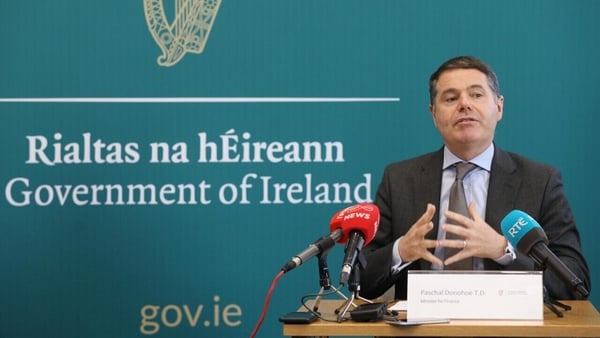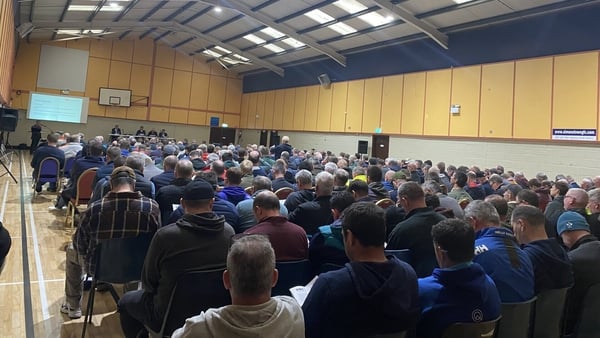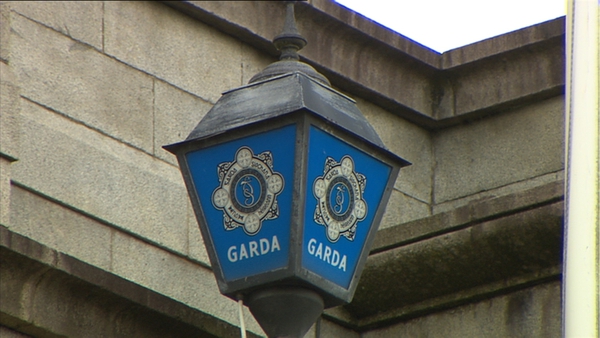Minister for Finance Paschal Donohoe has said he is expecting a revised agreement on proposals to change Ireland's corporate tax rate today.
He said he had further engagement last night with the European Union and OECD and that Cabinet will discuss the revised draft at its meeting this afternoon.
Mr Donohoe said at that point the Government will be able to evaluate the text and his recommendation.
Speaking to reporters in Dublin this morning, the minister said there had been huge engagement with the commission and OECD in recent days.
He said Government would be in a position to see a further text in relation to these issues at its meeting this afternoon.
Mr Donohoe said he was really aware of the profound importance of smaller companies in the economy.
The Taoiseach has said the vast majority of small and medium-sized enterprises will not be affected by the decision Government will take today.
He said the consensus in the OECD is that the change will not apply to companies with a turnover of less than €750m a year.
The Cabinet is meeting this afternoon to decide whether Ireland should sign up to sweeping global corporation tax reforms that would require the long-standing 12.5% rate to be increased to 15%.
The plan also proposes changes to where companies would pay their taxes, that the Department of Finance has estimated could reduce Ireland's tax take by €2bn a year.
The draft reforms have been brokered by the OECD among 140 countries, as part of a widespread agenda to modernise global tax rules, make them fairer and reduce the use of aggressive tax planning by some large multinational companies.
The relatively low 12.5% tax rate has been a cornerstone in Ireland's successful foreign direct investment offering for decades and has been fiercely defended by successive governments.
Ireland was one of just nine countries involved in the negotiations who did not sign up to the proposals last July.
We need your consent to load this rte-player contentWe use rte-player to manage extra content that can set cookies on your device and collect data about your activity. Please review their details and accept them to load the content.Manage Preferences
Read More
Farewell to the 12.5% - Ireland's saviour or a stick to beat us with?
Crucial decision looming for Ireland on corporation tax
While it accepted parts of the plan governing where companies should pay their tax, it objected to the reference to a global minimum tax rate of "at least 15%" being included in the plan, arguing it created uncertainty because the phrasing would mean the rate could be increased further at a later date.
Since then, the Government and officials have been involved in intense negotiations with other countries in a bid to have the draft changed.
Earlier this week, an updated version of the proposals was circulated to states, which had the words "at least" removed.
The removal of the stumbling block has paved the way for Ireland to join the accord, subject to a final decision by Cabinet later today.
However, the Government has also been seeking assurances from the EU that if it does sign up, the union will not seek to try to raise the minimum rate further in the coming years.
This would involve transposing the text of the OECD deal into EU law.
Negotiations have continued through the week on that and other outstanding issues related to the plan.
These include discussions around the level at which the minimum rate would apply, as well as the nature of possible exemptions or flexibility for certain areas like research spending.
350,000 people employed by multinationals
The Tánaiste has told the Dáil that 350,000 jobs are tied to multinationals in Ireland, adding that this indicates that the 12.5% corporation tax rate has "worked so well".
Speaking during Leaders' Questions, Leo Varadkar said "I believe that taxes should be low, simple and fair" for "companies and workers alike".
"We want to ensure that for smaller- and middle-size companies that we can continue to charge the lower rate of 12.5%," Tánaiste Leo Varadkar tells the Dáil | Read more: Read more: https://t.co/AouTcflgDA pic.twitter.com/gQwP8DdB9B
— RTÉ News (@rtenews) October 7, 2021
The negotiations on global corporation tax have been about "about larger countries" trying to "get a larger share of the pie" and "taking it off us", Mr Varadkar said.
"We had to protect our interests, seek guarantees," he added.
Richard Boyd Barrett, PBP-Solidarity, dismissed this as "scare tactics".
Mr Boyd Barrett asked "how do you morally justify ... willing to die in a ditch" to have "a minimal increase" in taxation on "the absolutely staggering profits on some of the largest and wealthiest corporations in the world?"
"You trenchantly oppose" any reduction on the taxation burden on working people, he accused the Tánaiste, saying the Government will worsen the situation with carbon taxes.
"Workers paid 20% on average - and corporations paid 5%" tax, he said.
Richard Boyd Barrett, PBP-Solidarity, questions the Government's efforts to prevent a "minimal increase" in taxation on "the absolutely staggering profits of some of the largest and wealthiest corporations in the world" | Read more: https://t.co/AouTcflgDA pic.twitter.com/e8Khn4w2WI
— RTÉ News (@rtenews) October 7, 2021
Ireland has to be part of agreement - Doherty
The Sinn Féin finance spokesperson has said the party believes Ireland has to be part of the OECD agreement.
Pearse Doherty said that it has made it "very clear we have to be part of this agreement".
He said this "still allows us to be competitive, but less competitive than where we were", so there is a need to focus in on housing, childcare, investment in infrastructure and higher education "to allow us to be competitive into the future".
Mr Doherty said that clarity is needed from the European Commission that Ireland is allowed to run a dual rate, to allow a rate of 12.5% be applied to smaller companies.
He said that the Government needs to focus on getting approval from the commission on state aid rules.
Corporation tax not only attraction for FDI - Deloitte
The head of tax with Deloitte has said that changes to Ireland's corporation tax rate "does not mean the death knell for Foreign Direct Investment in Ireland" and that other factors favour Ireland in attracting and retaining inward investment.
Lorraine Griffin told the News at One that while the tax rate is important, companies report that the availability of talent and a young, educated workforce, as well as EU membership are also critically important for investment here and should remain central to ensure competitiveness.
We need your consent to load this rte-player contentWe use rte-player to manage extra content that can set cookies on your device and collect data about your activity. Please review their details and accept them to load the content.Manage Preferences
Ms Griffin said that many companies with profits of over €750m operating in a global economy and still require a presence in the EU and Ireland is appealing "as a jurisdiction with a 15% tax rate, rather than a 20% or 25% rate".
She said that the proposals are intended to put a floor on tax competition and ending "the race to the bottom".
She said the other pillar of the agreement looks at businesses operating globally and seeks to redistribute the tax pie differently.
For example, she said that companies in the future may pay lesser amounts in some countries where they previously paid large amount of tax, and more in other countries where they make sales or do business.
While there is a lot of detail to work out it is certain that the direction of travel for companies with low effective tax rates at the moment is upwards, she added.
Additional reporting Will Goodbody







